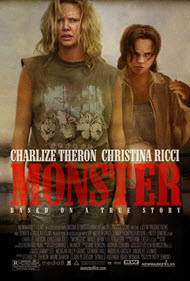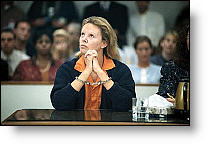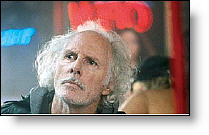Monster
 for strong violence and sexual content, and for pervasive language.
for strong violence and sexual content, and for pervasive language.
Reviewed by: Kenneth R. Morefield, Ph.D.
CONTRIBUTOR
| Moral Rating: | Very Offensive |
| Moviemaking Quality: |
|
| Primary Audience: | Adults |
| Genre: | Biography Crime Drama |
| Length: | 1 hr. 49 min. |
| Year of Release: | 2003 |
| USA Release: |
November 16, 2003 (festival) January 9, 2004 (limited) January 30, 2004 (wide) |





How can I deal with temptations? Answer
PURITY—Should I save sex for marriage? Answer
CONSEQUENCES—What are the consequences of sexual immorality? Answer
fornication and lust
sin and the fall of man
compare true goodness and righteousness
| Featuring |
|---|
| Charlize Theron, Christina Ricci, Bruce Dern, Lee Tergesen, Bubba Baker |
| Director |
|
Patty Jenkins |
| Producer |
| Charlize Theron, Matt Damon, Clark Peterson, Brad Wyman, Mark Damon, Donald Kushner, Sammy Lee |
| Distributor |
| Newmarket Films |
Charlize Theron plays real life serial killer Aileen Wuornos. The film chronicles Wuornos’s life between the time she forms an attachment to a young lesbian woman named Selby (Christina Ricci) through the time she is arrested of suspicion of multiple murders. We get one scene from the trial as well. Rated R for sexual situations, pervasive language, brief nudity, and extreme violence including rape and murder.
“Monster” is a serious work of art that owes more of its pedigree to “In Cold Blood” and “Dead Man Walking” than to more commercial entertainments such as “Silence of the Lambs” or “Copycat”. It is not just a serial killer movie that happens to be based on real-life. It is a real-life movie that is about a serial killer. The view of life it presents is bleak and despairing, and I doubt that many Christians who are not at least somewhat desensitized to portrayals of violence will be able to watch it productively. The film does not glamorize or eroticize its content, so I imagine those who choose not to see it should do so on the basis of its content alone and not its presentation.
I found its presentation to be good enough to make the movie superior, but not quite excellent. What “Monster” ultimately lacks is a point of view, and it is hard for art to be great without one. Don’t misunderstand me; I was not looking for oversimplifications and simple answers. I recognize that life is often ambiguous, and I do believe that art can be great without taking sides.
“In Cold Blood” (both the book and the film) ushered in a new sort of crime genre—one which neither sought to excuse or condemn. Like its predecessors, the protest novel and literary naturalism, this sort of fact-based report tries to avoid premanufacturing the explanation in the knowledge that such ready made points of view often shield us from truly looking at what happened. Richard Wright said of his fictional protest novel, “Native Son”, that he wanted it to be “hard” so that the audience would not have the “consolation of tears.”
“Monster” follows this model very well. Despite its title, it does not really explain Wuornos as a monster—or rather this is not its sole explanation. The first killing she commits is clearly in self-defense. We get hints of her abuse in childhood, and we see how Selby is not above manipulating her, even into a return to prostitution, in order to further her own desires. We see how Wuornos gets a cold shoulder from social services and in a broader sense from Christians. Yet we are not asked to feel sympathy for her, indeed we are almost forced to give sympathetic feelings no quarter. Like “Dead Man Walking”, this film has a calculated neutrality that is ultimately more about politics than art.
The cop who demands oral sex from her free of charge in return for not arresting her is balanced by the storage facility manager (Bruce Dern) who gives her food and tries to help her escape. Selby’s Christian family who rejects her prostitute friend (and Selby’s lesbian identity, for that matter) is balanced with a murder victim who does not pick up Wuornos for tricking but offers to help her (she ultimately kills him because he sees her gun, and she is afraid of getting caught). Wuornos’s own speech, in voice-over, that love doesn’t exist, is contradicted by her own claim in the film that she is trying to care for Selby.
This sort of scrupulous hedging can be passed off as ambiguity or paradox, and I would not be surprised if some who watch the movie experience it as such. If they do, they will probably like or appreciate the film more than I did. For my part, I don’t understand why one makes a movie about this subject matter and then worries about showing all sides of the issue. What is left? I had an artistic appreciation for the film, even if it did not resonate with me personally. Charlize Theron gives a gut-wrenching performance. Her penultimate scene with Selby, in which she tries to express her remorse, has all the poignancy of buried but not quite extinguished humanity that “The Lord of the Rings” CGI Gollum lacked.
Theron is also able to convey physically the sense of a person who is just not comfortable in her own skin. She exudes a palpable tension that physically drains both herself and the audience; it is all the more impressive because she is onscreen nearly the entire film.
According to ABCNEWS.com, Wuornos sent a letter to the Florida Court of Appeals stating, “I’m one who seriously hates human life and would kill again.” As a viewer who is deeply ambivalent about the death penalty, I appreciated the film’s attempt to try to avoid becoming a mere propaganda piece (does anyone remember the hideously awful “The Life of David Gale”?). The film also was able to convey to me the sense infused in the above quote (which doesn’t appear in the film) that Wuornos was probably in some ways beyond help and that perhaps—perhaps—execution could have been the only way to end her own suffering since she was in a place from which she could never return to be a productive member of society.
That she was not the sole
CONTRIBUTOR
I said earlier that I thought “Monster” was a little too scared of its material and uncertain of its audience to be a truly great film. It prompts great questions though, and for that it is a worthwhile film to see for people who can tolerate the graphic nature of its presentation.
My Grade: B+ | Violence: Heavy | Profanity: Extreme | Sex/Nudity: Moderate


Don’t get me wrong, I do believe that Aileen had a lot of issues, committed horrible acts of crime, needed serious help, and that she deserved the death penalty. But I also pray that she came to know Jesus because we don’t deserve heaven and less or more that she does.
[Very Offensive/5]
The reviewer says that the film is too scared of its own content to take any kind of moral stance on the film, and that opinion is fair enough. I would say, however, that to take a stronger line on the issue might either seem to justify murder, which obviously wouldn’t be acceptable, or seem to turn a blind eye to the role of cruel humanity in creating a “monster”. I really don’t think that the film could have taken a more subjective stance without offending huge numbers of viewers. I think that this film was incredibly hard to make and that it was done with a sense of compassion for all victims involved in the life of this woman.See all »
[Extremely Offensive/4]
[Average/5]
[Extremely Offensive/3]
It would have been good to see what happened to her as a child and what made her chose this horrible life. But I felt deep sorrow for this woman and a lot of anger towards Shelby’s parents who claim to be Christians but yet instead of showing her love they seem to condemn her and they do nothing to help her or Wuornos instead they condemn and seem very mean. To me I was also mad that when she wanted to start a new life and tried to do so no one would hire her no one would help her in any way and I know there are rules but there could have been something done the lady at Srs could have made phone calls to shelters or something but no one seemed to care. It’s sad that her childhood was so bad that it caused her to live a life like this.See all »
[Extremely Offensive/3]
[Extremely Offensive/4]
[Extremely Offensive/4]
[Average/4]
Charlize Theron was oscar-worthy and could possibly win, although I am banking on Keisha Castle-Hughes in Whale Rider. Theron’s performance was strong and very beliveable. Ricci (Selby) was a little distracting. The movie version of Selby would not have been likely to get involved with someone like Aileen (Theron). The direction was good, the acting (by Theron and the supporting roles, except for Ricci) was very good. The narrative by Theron’s character was some of the strongest I’ve seen in a movie. It wasn’t overdone to where your brain is trying to take in everything she says. Instead it makes a point that she (Aileen) does not believe in the cliche’s of love: Every cloud has a silver lining, love never fails; things that do not seem to have worked out in her life.See all »
My Ratings: [Very Offensive/4]